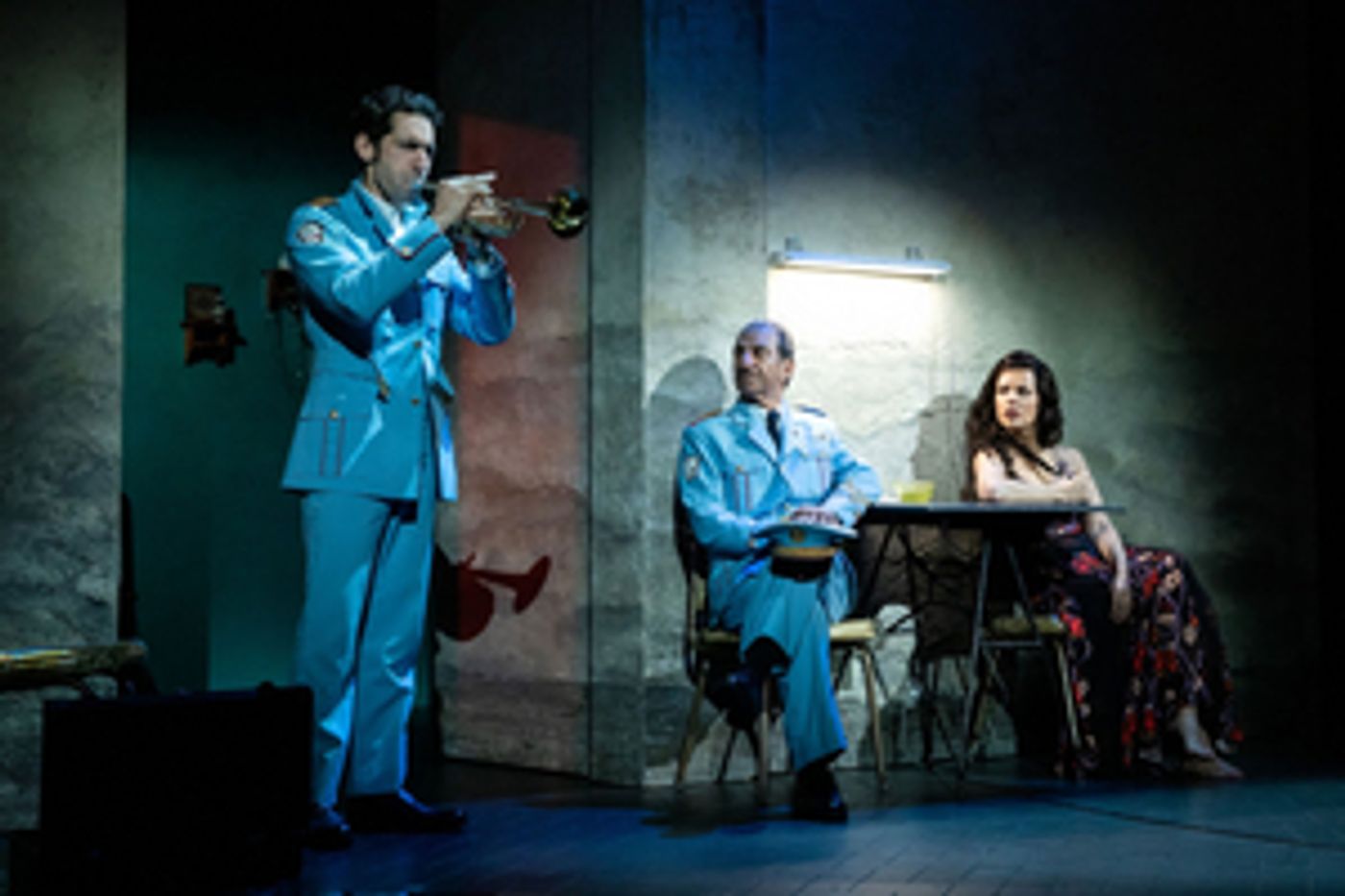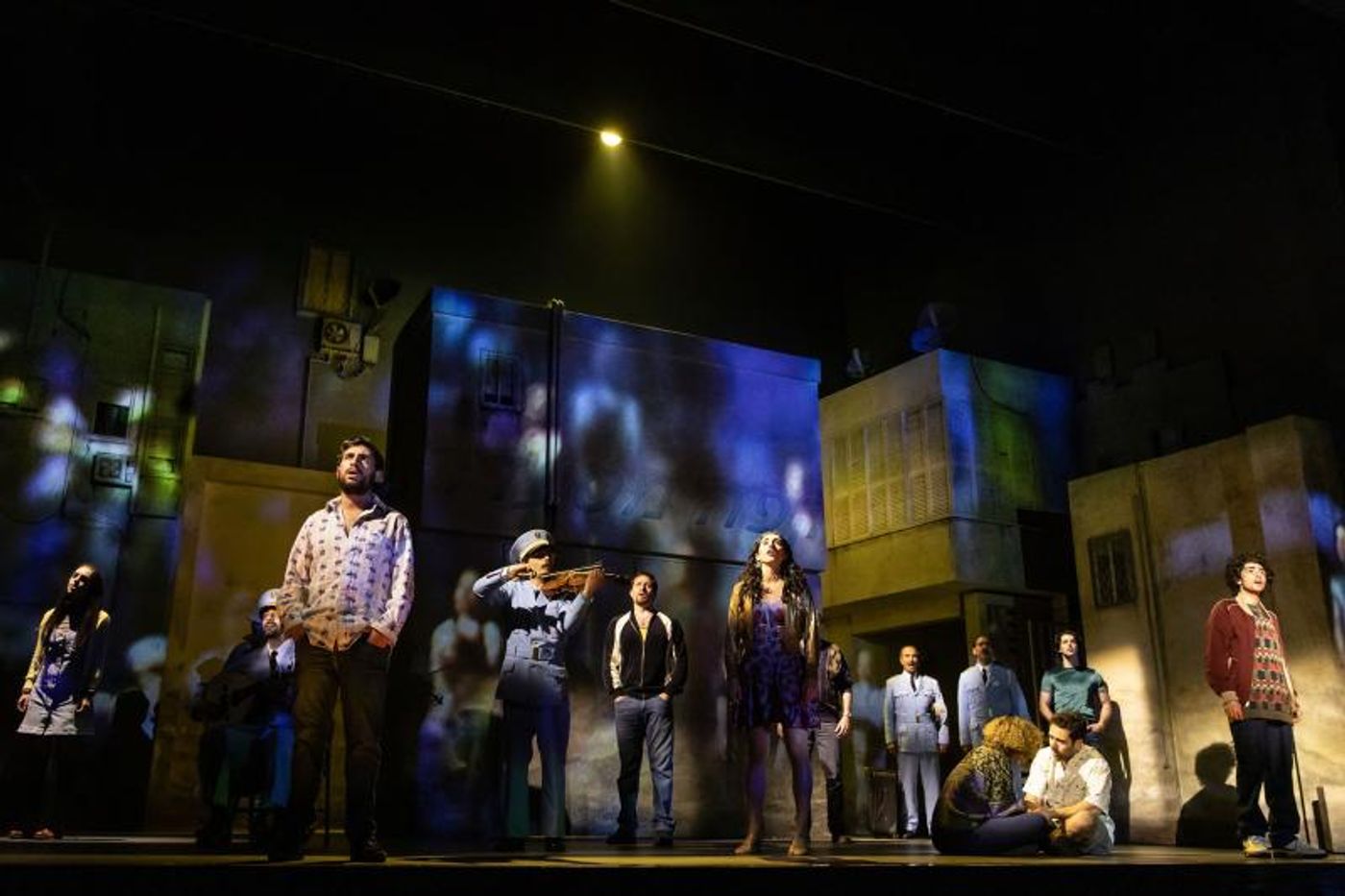Review: THE BAND'S VISIT Brings a Breathtaking 'Something Different' to the Winspear Opera House
 We're in the age of the "super-musical." Shows with storylines that span history, the globe, and heaven and earth; where dancers fly through space in a flurry of frenetic movements; and scores that aim to blow the roof off the auditorium, sending their melodies flying into the pop culture stratosphere. And while the effect has been undeniable thrilling, reinvigorating an art form always in need of experimentation, one can't help but feel a little exhausted.
We're in the age of the "super-musical." Shows with storylines that span history, the globe, and heaven and earth; where dancers fly through space in a flurry of frenetic movements; and scores that aim to blow the roof off the auditorium, sending their melodies flying into the pop culture stratosphere. And while the effect has been undeniable thrilling, reinvigorating an art form always in need of experimentation, one can't help but feel a little exhausted.
So it comes as a refreshing relief to find a secluded oasis within all the wildness where one can stop for a while, rest easily, and find the comfort that can only come from a quiet contemplation of our place in the world. The current touring production of THE BAND'S VISIT, winner of ten 2018 Tony Awards including Best Musical, has blown into Dallas to open up such a sanctuary to us. The musical plays at the Winspear Opera House through February 23 as part of a partnership between Dallas Summer Musicals and the AT&T Performing Arts Center.
Based on the acclaimed 2007 Israeli film of the same name, THE BAND'S VISIT follows the Alexandria Ceremonial Police Orchestra as they embark on a cultural goodwill mission from Egypt to an Arab cultural center in Israel. Due to a linguistic mix-up that remains prominent in the show without ever being overplayed, the band finds itself in a small town in the middle of the desert rather than the bustling metropolis they were expecting. THE BAND'S VISIT doesn't have a plot per se; there is little for the musicians to do except wait until morning for the next bus out of town. Instead, the one-act musical consists of what might be considered a series of interrelated vignettes, moments in which members of the band and the local folk come into contact with one another, sharing laughs and tears while ultimately changing each other in small but significant ways.
The music of David Yazbek, the composer/lyricist perhaps best known for his work on the musicals DIRTY ROTTEN SCOUNDRELS and THE FULL MONTY, is such a constant presence throughout the show that it might as well be a character unto itself. Blending together the rhythms and sounds of traditional Arab and Israeli music, Yazbek throws in strains of jazz and soft pop, making the score feel at once foreign yet vaguely familiar. Itamar Moses's book complements Yazbek's artistry well, finding a fine balance between pathos and playfulness that lands on the near side of comedy while always remaining deeply sincere.
As director, David Cromer applies the writers' same techniques to the overall look and feel of the production, with scenes floating from one locale to another with the swiftness of a fading mirage and actors conveying emotion with every slight movement of the hands and face. Indeed, Dallas Summer Musicals should be applauded for partnering with the AT&T Performing Arts Center to present this show. Its intimate qualities that do some much to draw the audience in while serving them a slice of real life would have been muted by the cavernous space the Music Hall at Fair Park. One hopes such partnerships continue for years to come.
The musical's relatively small cast has been expertly assembled, bringing performers and musicians from across the globe that interact with one another with the familiarity one normally sees between family. Especially notable is the inclusion of Israeli actor Sasson Gabay as the band's colonel and conductor Tewfiq, the role Gabay played in the original film. At the start of the musical, Gabay plays Tewfiq with a humble authority, an impersonal professional that sets him apart from his restless musicians or the lackadaisical townspeople. As the story progresses, though, Gabay sheds his character's tough exterior layer by layer, revealing the softness and pain that has brought him on this journey. It is difficult not to be charmed by Gabay's Tewfiq, with his shy averting of the eyes when speaking to a beautiful woman or his quietly powerful a capella performance of the haunting Arabic melody "Itgara'a."
Gabay's subtle approach is well complemented by the raw intensity of Janet Dacal as Dina, the café owner who arranges lodgings for the musicians while they ae in town. Dinah takes it upon herself to tour Tewfiq around town as the two come to open up to one another in ways they never had before. Dacal expertly delivers many of her lines with a bitter irony that dissipates as the plot carries along, and her songs-sung with a voice as smooth and powerful as a gust of jasmine wind in a stuffy room-reveal the dissatisfaction under her wry smile. Her numbers "Omar Sharif" and "Something Different" received some of the biggest ovations of the evening, largely because Dacal treats each word and each note as if they are the most important message that she will ever get to speak, savoring her melodies as much as her listeners will.

While Tewfiq and Dinah are largely considered to be the leads of the musical, THE BAND'S VISIT can easily be considered an ensemble piece in which nearly every character has their chance to share the spotlight, either through song, dance, or heartfelt cries of longing. Several performers in particular deliver almost haunting performances, though, that linger in the senses. Joe Joseph charms as the playboy trumpet player Haled, his youthful confidence infecting the locals who often find themselves too afraid to act. Joseph also arguably has the purest and most alluring voice in the cast, and his jazzy solo about love should be cherished since it's the only time audiences get to hear him sing on his own.
Pomme Koch and Adam Gabay (yes, that would be Sasson Gabay's son) play Itzik and Papi, respectively-Dinah's two friends who assist her at the café and agree to do their part in making the band feel welcome. As the perpetually out-of-work Itzik, Koch plays up certain aspects of the "deadbeat dad" stereotype while sweetly delighting audiences with his goofy rowdiness and tender affection for his wife and child. Adam Gabay, as the shy and somewhat neurotic Papi, also strikes the perfect balance of humor and heart. One such example comes during the number "Papi Hears the Ocean," in which Adam Gabay expertly jumps between notes flitting up and down the staff before finally approaching the girl he's been avoiding all evening.
A review of THE BAND'S VISIT wouldn't be complete without, of course, mentioning the band. Consisting of musicians and actor-musicians alike, the band remains almost always in view and earshot of the audience, playing much of the score from the stage with backing from more members behind the set. Their music not only serves to provide background or transition music; it also emphasizes the comradery of these men and the peace and joy they find with one another even in the strangest of situations. Watching these relationships play out without any dialogue over the course of the show makes it all the more exciting when audiences finally get to hear the long-delayed concert (stick around after the curtain call; it's well worth the slight wait in traffic).
At a time when tensions seem to be higher than ever and our senses are subjected daily to the next big spectacle, it's an odd feeling to come across a true work of art that realistically reminds us of what happens when we stop to appreciate and learn from those much different from ourselves. Perhaps nothing earth-shattering happens. Perhaps we still return to the same home to the same life with the same people. But we remain changed, even if only for a night.
Reader Reviews
Powered by
|
Videos

